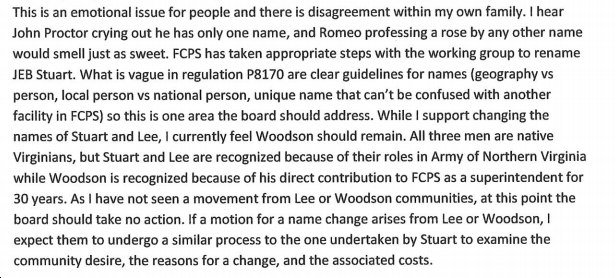The following are responses to the Fairfax County Democratic Committee (FCDC)’s questionnaire from the eight candidates for the Fairfax County Public School (FCPS) Board’s vacant, at-large seat. I’ll post the responses in random order. The candidates are, in alphabetical order: George Becerra, Marianna Du Bosq, Carolyn Hendler, Shaista Keating, Stacia Keel, Karen Keys-Gamarra, Michele Menapace and Abrar Omeish. Here are their responses to question #7 (“Explain your position on renaming JEB Stuart, Lee, and/or Woodson high school.”) of the eight-question FCDC Q & A. I’ll post the other Qs & As in separate posts. Note that FCDC will hold its meeting to endorse a candidate for this position on Friday, June 23rd, 7pm at the Fairfax County Government Center.
Karen Keys-Gamarra
I support the change of names of the schools mentioned above
George Becerra

Shaista Keating
As Virginians, we cannot and will not ever erase our past. But while much of our rich history deserves celebrating, slavery represents an ugly chapter of our history that we must close. All children must feel welcome in their schools and thrive in their school communities.
Today’s FCPS student body is diverse in every sense of the word, and that diversity is part of our strength as a school system. We ask our students to closely study history. A group of such students from JEB Stuart have come to the School Board to request a name change for their school. The sitting School Board has agreed to resolve this issue by the end of July. I will support their decision.
I also support the creation of a clear FCPS naming policy to spell out when it is appropriate for the School Board to consider and implement name changes for schools within Fairfax County. Further, I support raising alternative sources of funding (including private funding) to help accomplish name changes where they are appropriate.
Abrar Omeish
–Whether you believe the arc of history bends towards justice (MLK) or chaos (Coates), history is a crucial point of reference for our understanding of self and community.
–In some ways, renaming is an equal access/accessibility question. Certain students are disadvantaged over others in understanding and experiencing school spirit and community when their very identity feels under attack.
–While many counterarguments exist about remembering the past and/or freedom of
expression, we must distinguish between catering to children and a theoretical argument—in this case, youngsters will learn by our example, and this lesson supports our portrait of a graduate. Youth also require a sense of love, safety, and acceptance to learn well and succeed.
–First, reference to community input on the matter should be made (a year and a half ago, only 35 percent favored a change). Recent input would provide an accurate assessment. School-specific polls should also be taken after the case is explained.
–School Board members can make a determination based on presented arguments, logistical concerns, and community input (and the recommendation of the Ad Hoc committee). There is an important balance between adopting the collective community desire and between recognizing the need for thought leadership in certain cases, particularly when the majority is inclined towards status quo and when the most-directly affected group is a minority.
–A consideration worth noting is the budget, though civil rights and social justice causes are often and have been historically undermined using this argument. Can families and students benefit more from these funds being put to use in a different way?
–Creative solutions for such funding (e.g. changing the field house paint to look different when it needs renovations anyway, posing no additional cost)
–Engaging partners who have developed proposals for funding solutions already (e.g. SURJ)
Carolyn Hendler
The school board has to carefully weigh the negative association of these high school names, the concerns with the name’s historical significance and also keep in mind the financial costs of name changes. These changes should be a priority in the coming years.
Marianna Du Bosq
I believe that schools named after Confederate generals and/or a superintendent that opposed desegregation warrant a compelling need for a name change.
A school board member has publicly asked the question “What’s to be gained?” from renaming the school. Currently, there are African American students attending schools named and honoring individuals that supported racial segregation. I worry about the message sent to those students and their peers when they walk through the doors of a school honoring individuals that stood up for deeply offensive actions.
For context, Henrico County in Virginia, unanimously voted to strip the name of Senator Byrd Sr from a middle school because of his opposition to desegregation. The Orange County School Board in Orlando, Florida, one of the districts where I taught, renamed Robert E. Lee Middle School.
Arguments have been made that those looking to change the name are guilty of presentism and that JEB Stuart and his role in the Civil War were a product of his time. I would reiterate the fact that the name JEB Stuart does not reflect the values of its diverse student body and the board has the opportunity to honor the school after someone who does.
Stacia Keel

Michele Menapace



















